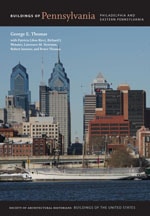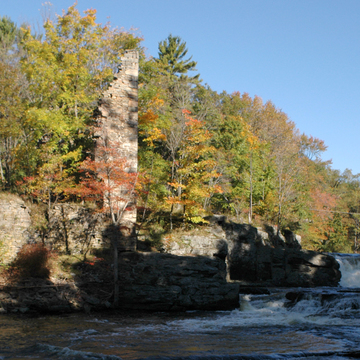Stoddart's Mill today is little more than a sublime set of ruins contrasting with the force of the Lehigh River. The town itself tells the central story of the early republic as Philadelphians attempted to control regional markets. The site also describes the heavy toll exacted by environment on the entrepreneurs of early America. In 1816, local landholder John Stoddart commissioned a four-story-tall gristmill from the designs of famed millwright Oliver Evans. It was located just below the falls of the Lehigh River, a spectacular natural site that provided a powerful head of water for the mill and formed the upriver terminus for barge traffic. Stoddart's vast mill was intended to attract the grains of the Wyoming Valley. Because of its uneven flow that ranged from flood to trickle, the Lehigh was impossible to navigate, making it a bottleneck in moving timber and grain to the Delaware River and then to Philadelphia. It took the equally visionary Philadelphia industrialist Josiah White to conceive of channeling and controlling the river to create a one-way (downstream) navigation that would carry the region's greatest resource, coal, to the industries of Philadelphia. In 1818, after attempting to raise money from Philadelphian Rueben Haines, White found Stoddart, who White recalled in his Autobiography was “a leading man among the Mound characters, being esteemed Luckey [sic].” Stoddart's capital and White's will created the Lehigh Navigation Company, which, until the great flood of 1862, continued to ship timber, flour, and coal to southern markets. The great forest fire of 1875 further reduced that trade and by the 1890s the site had become a resort. Today the properties are privately owned and there is no public access to the mill. A few of the early buildings, including the mill manager's house, survive, as well as one immense corner of the mill, attesting to the vision and the risk of the early settlers. There are few more sublime sights in eastern Pennsylvania.
You are here
Stoddart's Mill
1816–1818, Oliver Evans; 1818–1819, Josiah White. Off PA 115, 2.4 miles northwest of Blakeslee. Not open to the public.
If SAH Archipedia has been useful to you, please consider supporting it.
SAH Archipedia tells the story of the United States through its buildings, landscapes, and cities. This freely available resource empowers the public with authoritative knowledge that deepens their understanding and appreciation of the built environment. But the Society of Architectural Historians, which created SAH Archipedia with University of Virginia Press, needs your support to maintain the high-caliber research, writing, photography, cartography, editing, design, and programming that make SAH Archipedia a trusted online resource available to all who value the history of place, heritage tourism, and learning.


